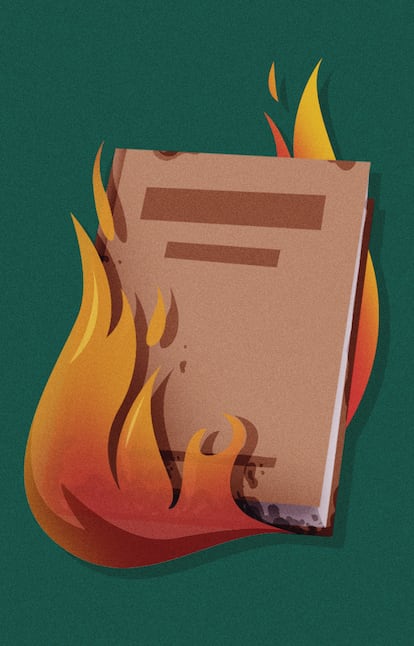Censorship just isn’t what it used to be
The United States, which took freedom of expression further than any modern democracy, is now a contradictory society where prohibiting is part of the daily agenda

When Pope Paul IV came up with the Index of Forbidden Books back in 1559, his goal was to erase everything Protestant from the conscience of Catholics; every book, every author. Now, those were ambitious projects: it was not only a matter of protecting the earthly life of the faithful around the world, but their eternal life too, because reading the bad books could condemn a soul to hell. The Spanish Inquisition, which had its own ideas about the risks of the soul, included Jewish or Judaizing books on the list (of course: we not only remember Paul IV as the creator of the Index, but also for having locked up the Jews of Rome in a ghetto), but it also perceived with mind-blowing clairvoyance the danger posed by a book like Lazarillo de Tormes, that hierarchy-destroying machine, and its chapter in the Americas saw the same, or something very similar, in Don Quixote, which after being banned ended up reaching to the colonies — Irving Leonard tells us, I think — smuggled between wine barrels.
Ah, those were the days. It was all about preserving everything that was sacred in societies, defending them from the subversion of the values that gave them structure and strength and freeing them from the plagues of doubt, uncertainty and disbelief. It was, ultimately, about protecting those societies in spiritual crisis from the heresies that reared their heads everywhere, always with the invaluable complicity of the printing press, that despicable device that only seemed to work for the Reformation and that every day cast into the world more dangers than a poor helpless censor of limited time and finite attention could control. You really have to be cold not to feel sympathy for these poor men who had to face an unusual abundance of new books, constantly pouring out from all corners of Europe, often written in a language that everyone who read could read. How to censor them all?
It was simply impossible. Those books — think of Copernicus or Galileo, to mention two obvious examples — that tried to imagine a new world, or that presented a version of the world that was radically different from the one that the powers had managed to impose after centuries of effort, were too many, but also too complex. One of the various voices in Terra Nostra, the novel by Carlos Fuentes, eloquently explains what the Inquisition would have liked: “Investigate everyone, until everyone is afraid to even hear and speak to each other; captivate the understanding of the things of Faith; and, in short, here and there, impose silence on everyone, as by the slightest fissure excused by science or poetry, heterodoxies, errors, Judaic, Arabic and idolatrous flaws slip in.” Something was achieved, of course: fear was achieved, silence was achieved, denunciation was achieved, the burning of books, and sometimes their authors, was achieved (unquestionably, a proven effective way to prevent the publication of future books).
This was in my mind during a recent trip through the southern United States, as I saw the forces of censorship blossom all around once more. It seems different, though; censorship is not what it used to be. The United States, which for many years took freedom of expression further than any other modern democracy, is today a contradictory society, mired in implausible culture wars, where forms of censorship that not long ago would have seemed impossible, or that we would have deemed impossible under the much bragged about First Amendment, appear to be in better shape than ever. I heard that in South Carolina a student complained about the memoir of Ta-Nehisi Coates on the grounds that it made him feel ashamed of being Caucasian: the school’s response was to ban the book. A Tennessee college banned Art Spiegelman’s graphic novel Maus, accusing it of including sexually explicit material, because there is a panel showing a drawing of a naked woman in the bathtub. The fact that the woman had just killed herself didn’t help.
(In a certain sense, it doesn’t seem like a coincidence that Salman Rushdie, who received death threats more than 30 years ago from a powerful censorial regime, who lived under protection until the authorities believed that the threat had passed, who even had good reason to assume that his absurd sentence had been commuted, was attacked now and not 10 or 15 years ago, in those days that already seem distant because the climate has changed so much. But that is perhaps the subject of another column).
The question is whether this strange climate of contemporary censorship, which comes from different political sides and is supported by different justifications (social media fits all) can be contagious, as everything in our hyperconnected world is. I don’t think that the tendencies of the Trumpist right would easily reach Spain, for example, despite the fact that just a few weeks ago the authorities of the town of Valdemorillo canceled a staging of Orlando, the Virginia Woolf novel that had already been censored by Francoism 80 poorly counted years ago, when a bookstore tried to import a thousand copies of those published by Victoria Ocampo in her legendary Buenos Aires publishing house. Franco’s censorship gave no explanation beyond one word, “suspended,” written in the censor’s red pencil – but then, as now, its contents were uncomfortable: in the novel, a character changes genders as time and reincarnations go by, and sexual identity is indirectly discussed with something that cannot be called anything but audacity. Why was the play canceled now? There are no clear explanations, but the feeling of déjà vu is not comfortable.
The problem with censorship — apart from the incalculable damage it does to the circulation of ideas, the exercise of hard-won freedoms and, in general, to the health of any democracy — is how ridiculous it looks. How can we not find ridiculous the Francoist censor who 60 years ago received The Time of the Hero, a novel by a young Peruvian writer, and deemed unacceptable that a fictional soldier had a “whale belly” and that a chaplain frequented “whorehouses,” but accepted without a problem that the chaplain frequented “brothels” and that the soldier had a “cetacean belly”? No less ridiculous (even if it was made by private companies in a democracy instead of the public bodies of a dictatorship) was the decision of the editors of Roald Dahl, Agatha Christie and Ian Fleming, who a few months ago embarked on a particularly silly crusade of political correctness, changing words, expressions and even entire scenes to strip the fiction of anything that might be offensive. Offensive to whom? That is the hardest question, because anyone can feel offended by anything.
And with that infallible argument — that of not offending anything or anyone: neither the morality of a country nor the sensibilities of one individual — they want to achieve, for different reasons, more or less the same thing.
And people say you can’t go back in time.
Sign up for our weekly newsletter to get more English-language news coverage from EL PAÍS USA Edition
Tu suscripción se está usando en otro dispositivo
¿Quieres añadir otro usuario a tu suscripción?
Si continúas leyendo en este dispositivo, no se podrá leer en el otro.
FlechaTu suscripción se está usando en otro dispositivo y solo puedes acceder a EL PAÍS desde un dispositivo a la vez.
Si quieres compartir tu cuenta, cambia tu suscripción a la modalidad Premium, así podrás añadir otro usuario. Cada uno accederá con su propia cuenta de email, lo que os permitirá personalizar vuestra experiencia en EL PAÍS.
¿Tienes una suscripción de empresa? Accede aquí para contratar más cuentas.
En el caso de no saber quién está usando tu cuenta, te recomendamos cambiar tu contraseña aquí.
Si decides continuar compartiendo tu cuenta, este mensaje se mostrará en tu dispositivo y en el de la otra persona que está usando tu cuenta de forma indefinida, afectando a tu experiencia de lectura. Puedes consultar aquí los términos y condiciones de la suscripción digital.









































